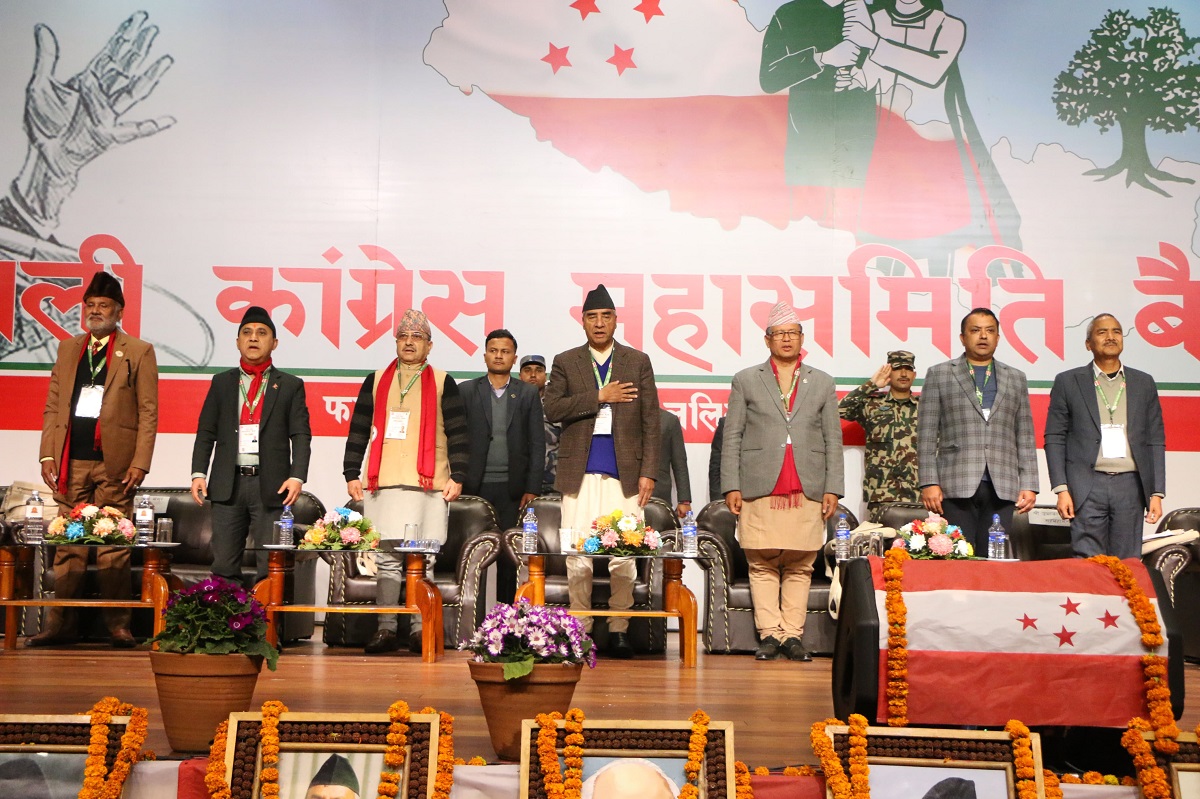The Mahasamiti meeting of Nepali Congress (NC) held at Godavari, Lalitpur from February 19-22 endorsed the proposals of General Secretary Gagan Thapa to stop pre-election alliance, and that of another General Secretary Bishwa Prakash Sharma to hold primary to pick party candidates and prepare exit policy for the leaders.
Vice-president Purna Bahadur Khadka presented policy document, General Secretary Gagan Thapa the organization report, another General Secretary Bishwa Prakash Sharma the report on contemporary politics and Accounts Committee Coordinator Shyam Ghimire the financial report during the four-day Mahasamiti meeting. All the four proposals were passed unanimously by the Mahasamiti members.
The proposals were passed unanimously but there was clear division between the factions of NC President Sher Bahadur Deuba and the others regarding the transformative proposals of the general secretaries.
NC President Sher Bahadur Deuba and General Secretary Thapa had reached agreement on the latter’s proposal to shun pre-election alliance in a meeting of office-bearers and former office-bearers late night on February 19 following a longstanding difference over the issue.
The party had then sent Thapa’s report to the press to print copies to distribute to around 2,300 Mahasamiti members participating in the Mahasamiti meeting.
Khadka then duly removed the issue of pre-election alliance from his report presented on February 20 to give uniformity to party documents following the agreement the previous night.
But the Deuba faction sent text messages to its members urging them to oppose the proposal to ban pre-election alliance. They duly opposed the proposal during the closed session.
Similarly, Sharma proposed that the party should start a pilot program allowing local cadres to pick the party’s candidates through primary in some places. He also proposed an exit strategy for leaders stressing that a person can become president for only one term, prime minister (PM) twice, minister thrice and lawmaker four times.
But the Deuba faction was against the proposals of general secretaries and Deuba himself urged to not take any decision on pre-election during the meeting of office-bearers and former office-bearers held on the last day of Mahasamiti meeting at Godavari itself. But General Secretary Thapa stood firm on his stance.
The leaders were worried that voting on the proposals would not just extend the Mahasamiti meeting but also sent a message that the party was divided.
The meeting of office-bearers and former office-bearers held on the last day, therefore, decided that the proposals will be passed unanimously by the Mahasamiti meeting and the central committee meeting will endorse them with some changes on the basis of suggestions.
Deuba has a majority of around 82 percent in the central committee, and the Mahasamiti members are now worried that the transformative decisions of the Mahasamiti meeting would be undermined by the central committee.
The 11-point statement issued as conclusions of the Mahasamiti meeting does not mention the most important proposals including NC contesting all the elections on its own, holding primary to pick party candidates and the exit policy for leaders.
The fact that the statement issued by Chief of Publicity Department Min Bahadur Bishwokarma, who is from the Deuba faction, in the 10th point mentions that important suggestions on those issues were received during the closed session, and the proposals will be endorsed by the central committee meeting with some changes on the basis of those suggestions raises suspicions that Deuba may try to undermine those proposals of general secretaries.
Speaking during the closing session Khadka stressed that the Mahasamiti meeting took only one decision (on the financial report), and the three proposals would be finalized by the central committee after some changes. Deuba also assured that the proposals passed by the Mahasamiti would be changed.
The claims of Deuba and Khadka, however, are against the party statute which in article 19 mentions that the central Mahasamiti can take decisions on all party affairs apart from election of central members and office-bearers.
Article 22, meanwhile, states that the central committee can implement decisions of central Mahasamiti and general convention, and monitor whether those decisions have been implemented or not. The central committee is authorized to present proposals in the Mahasamiti meeting but cannot change the decisions taken by the Mahasamiti meeting.
The grand old party, therefore, had held central committee meeting before the start of the Mahasamiti meeting on February 19.

